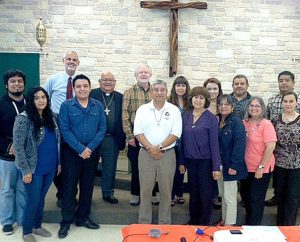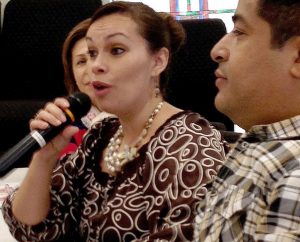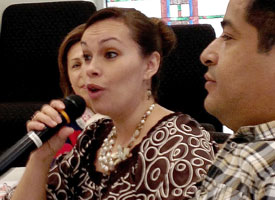By Megan K. Mertz
“Latinos have a lot to share with the rest of the Synod,” said the Rev. Ruben Dominguez, pastor of El Buen Pastor Lutheran Church in McAllen, Texas. “We bring youth to the Synod mix and strong, close-knit families.”
Dominguez served as chaplain at the second annual Texas-area Hispanic workers conference Oct. 11 in San Antonio.
Some 20 Hispanic church workers and lay leaders from Houston, Brownsville, McAllen, Del Rio and San Antonio came together for the event to discuss the process of growing from a mission plant to a full-fledged member congregation of the Synod.

The Rev. Dr. Carlos Hernandez, director of LCMS Church and Community Engagement — which includes the strategic development of Hispanic ministry — led the conference workshop.
“Many of our Hispanic congregations are not organized as congregations that can vote, have a presence at conventions or send the pastor as a delegate,” Hernandez said. “There’s a feeling that our Hispanic congregations don’t have enough of a voice in the matters of our Synod. We want to develop congregations with greater maturity and all the rights and responsibilities that come with it.”
Dominguez agreed: “Most of the Hispanic ministries existing in the Synod are still new in many ways. A good number of those ministries are interested in becoming established Synod ministries. The conference provided the initial information needed to go that way.”
Participants also discussed ways to respond and adapt to cultural shifts without losing their Lutheran identity.
Encouraging the group
The gathering was the second to be held at Iglesia Luterana Cristo Nuestro Salvador (Christ Our Savior Lutheran Church) in San Antonio in recent history.
“For LINC San Antonio and Christ Our Savior, it was an honor to host this conference, because we see that it provides an opportunity to our fellow brothers and sisters in the Hispanic ministry to see each other, to encourage one another,” said the Rev. Dr. Ely Prieto, executive director of LINC San Antonio and host pastor of the conference.

“We realize we are not alone in this ministry. We have one another and of course, we have the Lord of the Church, Jesus Christ, leading us in our missionary efforts.”
After just one year, the Rev. Michael Newman, a mission and ministry facilitator for the LCMS Texas District, said he has already seen an increase in unity and encouragement among Hispanic-ministry workers in the district. That’s one reason he hopes to continue organizing the annual gathering.
“When it comes to ministry outcomes, I think it has served as a way to raise up lay leaders and develop them and include them in more ministry action,” he continued. “And the primary need of Hispanic ministries in Texas and around our nation is entrepreneurial Latino leaders for the new generation.”
Encouraging congregations
To strengthen Hispanic ministry in the Synod, Hernandez focuses on providing encouragement and support both to groups — through regional conferences like this one — and to individual congregations that are struggling with specific issues.
Following the conference, he and the Rev. Steve Schave, director of LCMS Urban & Inner-City Mission, visited El Calvario Lutheran Church in Brownsville, Texas.
The multiethnic congregation located just blocks away from the United States-Mexico border has been without a pastor for nearly two years.
Despite the challenges, Hernandez and Schave see great opportunity in the congregation’s strategic location in reaching out to new immigrants arriving from Central America, second-generation Latinos and people who will soon move to the area when planned technology and medical facilities open.
“Its ministry importance is like a modern-day Ephesus or Corinth, a global crossroads,” Schave said. “Paul did his work in these port cities, where the world is coming in.”
According to Hernandez, the LCMS and Texas District are collaborating on ways to support the calling of a missionary pastor for El Calvario.
“We believe that we need to call full-time, fully trained workers,” he said.
Hernandez and Schave are working to develop a funding model to support sending missionaries to strategic national mission fields all around the country.
“I think being able to equip and resource and encourage as a team is really helpful,” Newman said of the collaboration between the Texas District and the Synod. “And not just resources in funding, but in ideas and strategic planning to let El Calvario know that it’s an equal partner as we walk together for the Gospel.”
Megan K. Mertz is a staff writer with LCMS Communications.
Posted November 4, 2014
